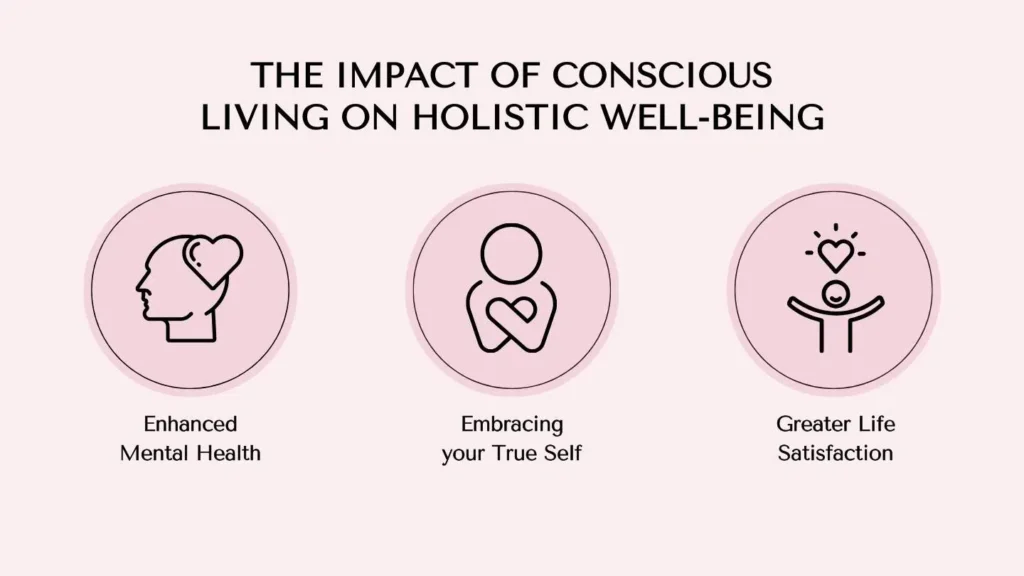Introduction
Conscious living is not just a trend. It is a deep spiritual practice. It means living with intention, awareness, and presence. You stop running on autopilot. Instead, you make mindful choices that match your values. This shift helps you find clarity, peace, and emotional balance.
In India, this idea has always been part of traditional life. From yoga and Ayurveda to karma and dharma, spiritual awareness forms the foundation of conscious living. Now, more people across the world are also discovering the power of living with purpose.
What Is Conscious Living?
Conscious living is being fully aware of your thoughts, actions, and emotions. It means watching your habits and changing what no longer serves you. You stop reacting to life and begin responding with thought and care.
You choose how to act, speak, and spend your energy. Whether you are eating, talking, or working—you do it mindfully.
Why Conscious Living Matters

Boosts Mental Clarity
When you live with awareness, your mind feels lighter. You can see things clearly. You make better decisions. Your stress levels drop.
Builds Emotional Strength
You become aware of your emotions before they control you. You respond calmly in tough situations. This supports healthy relationships.
Promotes a Mindful Lifestyle
You start slowing down. You enjoy small things like a hot cup of chai, nature, or silence. Life feels more meaningful.
Connects with Indian Spirituality
Conscious living aligns with Satvik living, yogic practices, and spiritual values from Indian traditions. It brings balance to your life.
Supports Physical Health
You sleep better, eat healthier, and make choices that support wellness. Following Ayurvedic daily routines (Dinacharya) naturally becomes easier.
Also Read 7-Day Spiritual Growth Challenge: Simple Practices to Heal, Transform, and Awaken
Key Pillars of a Conscious Life
1. Self-Awareness
Start observing your thoughts and feelings without judgment. Journaling, meditation, or simply sitting in silence can help.
2. Mindful Choices
From what you eat to how you speak, act with awareness. Ask yourself, “Does this align with my values?”
3. Emotional Intelligence
Be honest about your feelings. Learn to express them gently. Practice forgiveness, patience, and compassion.
4. Spiritual Practices
Daily prayer, yoga, or mantra chanting can ground your day. Even five minutes of mindful breathing can calm your mind.
5. Connection with Nature
Walk barefoot on grass. Sit under a tree. Water your plants. Nature brings you back to your natural state of peace.
Steps to Start Conscious Living
Step 1: Begin with Your Breath
The breath is your anchor. Start the day with 5 minutes of deep breathing or meditation.
Step 2: Eat Mindfully
Eat in silence at least once a day. Focus on taste, smell, and gratitude. Follow a Satvik diet for mental clarity.
Step 3: Declutter Your Space
Let go of what you no longer use. Clean space brings a clear mind.
Step 4: Digital Detox
Turn off your phone for an hour each day. Use that time to read, reflect, or connect with loved ones.
Step 5: Set Daily Intentions
Start your morning by setting one intention. For example, “Today I will listen more,” or “Today I will be kind to myself.”
Indian Wisdom That Supports Conscious Living
Ayurveda
This ancient system teaches how to live in harmony with nature. It focuses on balance through food, routine, and lifestyle. Conscious living supports Dosha balance and wellness.
Yoga and Meditation
These practices connect the body, mind, and spirit. Even a short daily practice builds awareness and emotional strength.
Bhagavad Gita
This sacred text teaches living according to one’s dharma (true duty) with awareness and surrender. It shows how conscious action leads to inner peace.
Jain and Buddhist Teachings
These traditions emphasize ahimsa (non-violence), mindfulness, and compassion—all key to conscious living.
FAQs About Conscious Living
Q1: Is conscious living possible with a busy Indian lifestyle?
Yes. Even small steps like mindful eating or daily reflection can create big shifts. You don’t need hours—just intention.
Q2: Do I need to follow a religion to live consciously?
No. Conscious living is not tied to any religion. It is about awareness, presence, and purpose. Spiritual practices can help, but they are not required.
Q3: What role does Ayurveda play in conscious living?
Ayurveda teaches awareness of the body and nature’s rhythm. It supports daily routines that build inner peace and health.
Q4: How can families practice conscious living together?
Start small. Eat meals without TV. Go for evening walks. Practice gratitude at bedtime. Make it a joyful practice, not a strict rule.
Q5: Can conscious living help with anxiety and stress?
Yes. Mindfulness and intentional living help calm the mind. You feel more in control and connected to what really matters.
Conclusion
Living a conscious life is a spiritual journey. It is about awareness, kindness, and purpose. It helps you connect deeply—with yourself, others, and the divine. Whether you’re walking through a crowded Indian street or meditating in silence, conscious living makes every moment meaningful.
You don’t need to be perfect. You only need to start. Choose one small step each day. Over time, your life will shift from chaos to calm, from reaction to reflection, from stress to spiritual growth.
Awaken your life. Live consciously. Live fully.










